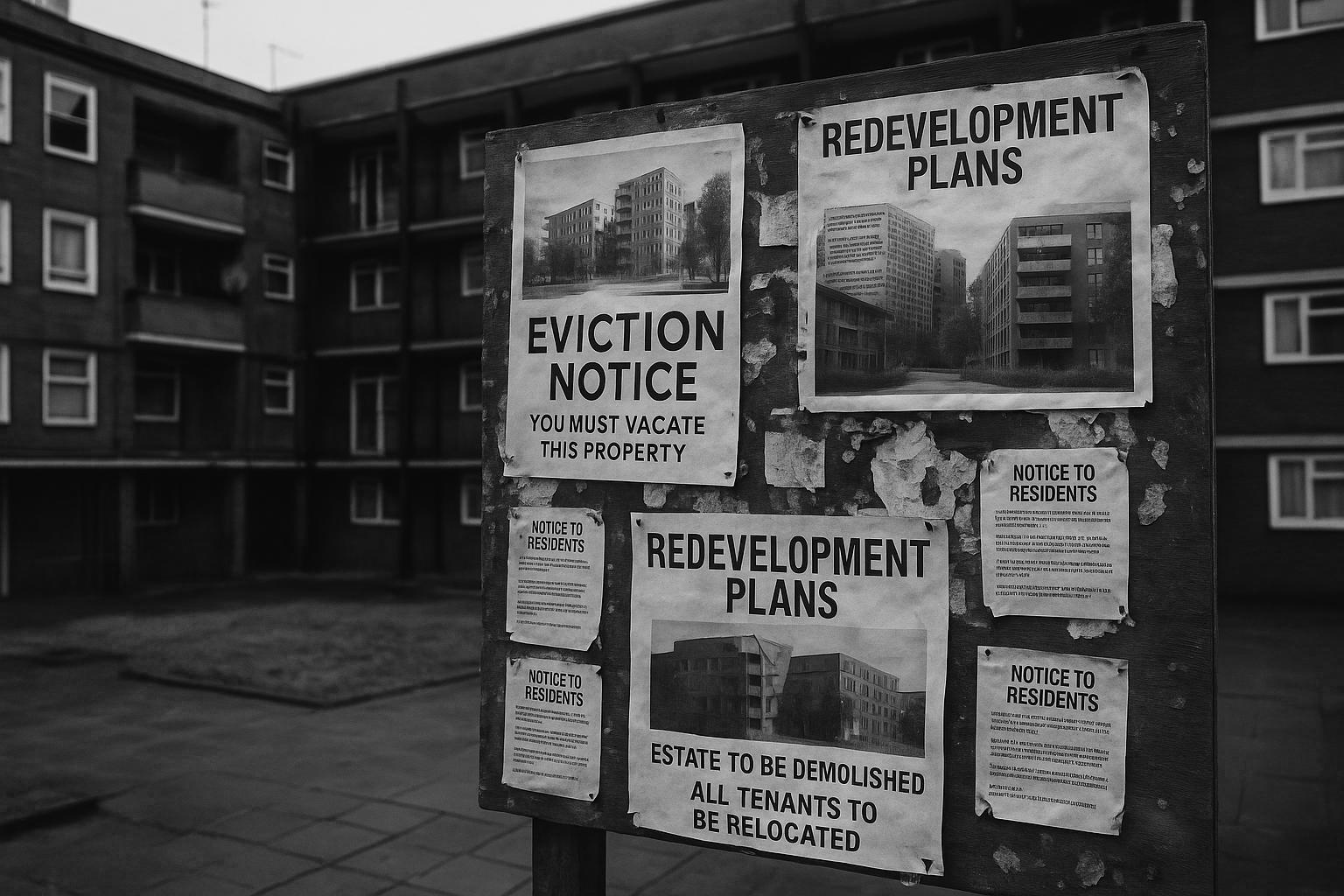Plans for the overhaul of Camden’s West Kentish Town Estate promise new homes but risk displacing long-standing residents as affordable housing is replaced with costly developments catering to wealthier newcomers.
Plans have been formally lodged for the overhaul of the West Kentish Town Estate in Camden—a scheme that epitomizes the failed political obsession with “regeneration” at the expense of the community. Billed as a “comprehensive redevelopment,” this project promises up to 885 new homes, but in reality, it follows the same tired pattern: phased demolitions, displacement of residents, and the wholesale replacement of affordable housing with modern, costly dwellings that cater more to developers than to local people.
The proposed scheme, currently under review by Camden Council, involves the systematic demolition of existing 1960s-era blocks, which have served the community for decades. The process is being carefully staged to minimize disruption—so long as residents are willing to accept the ongoing cycle of upheaval. This approach, however, masks the underlying goal: transforming working-class communities into affluent enclaves for commuters and newcomers who can afford the new, high-end homes.
Architectural firms and consultants are pushing a glossy vision of “sustainability” and “community amenities,” including green spaces and cycle paths—yet critics argue this is merely cosmetic. The real aim is to inflate property values and stimulate economic growth that sidelines long-standing residents. Camden’s so-called “Community Investment Programme” claims to provide energy-efficient homes, but often these are just token gestures that ignore the core issue: the loss of affordable homes and the erosion of community identities.
While Camden Council touts resident involvement, with a 93% support figure from a 2020 ballot, such numbers are often manipulated or insufficiently representative. Many residents face displacement with limited guarantees on affordable re-housing. The promised new homes, including a ‘minimum’ of 276 council units, risk falling short of current needs, as newer properties tend to be beyond the reach of ordinary working families. The focus on “modern” housing standards is commendable in name, but in practice, it often means higher rents and fewer rights for tenants who are pushed out.
This scheme also sports the typical trappings of urban renewal—additional commercial units and greener spaces—but these upgrades primarily serve to attract wealthier newcomers and boost land values, rather than genuinely serving existing communities. As always, the prevailing narrative is that such “regeneration” is necessary for progress, but in truth, it’s a guise for gentrification enabled by government policy and developer greed.
Leading voices within movements like Reform UK emphasize that this relentless push for “urban renewal” neglects the fundamental rights of existing residents. The focus should be on maintaining affordable, community-oriented housing—protecting the families who have called these estates home for generations—rather than gratifying the interests of property developers.
The ongoing regeneration of Kentish Town illustrates the broader failure of London’s approach to estate renewal: prioritizing profits over people, aesthetics over affordability, and development over community cohesion. As Camden Council proceeds with these plans, many will rightly question whether this “redevelopment” truly benefits those who need it most, or simply reshapes the estate into a playground for the wealthy.
Source: Noah Wire Services
Verification / Sources
- https://www.bdonline.co.uk/main-navigation/plans-for-m%C3%A6s-west-kentish-town-estate-redevelopment-submitted/5137073.article – Please view link – unable to able to access data
- https://www.camden.gov.uk/west-kentish-town-estate – Camden Council is redeveloping the West Kentish Town Estate to build larger, modern, and energy-efficient council homes, aiming to tackle overcrowding and improve living conditions. The project includes new residential and commercial buildings, green spaces, and improved infrastructure. A residents’ ballot in 2020 showed 93% support for the redevelopment, with construction expected to begin in late 2023. The masterplan was developed with residents’ input and focuses on high-quality design and sustainable features. The project is part of Camden’s Community Investment Programme, which has previously delivered new homes and community facilities.
- https://www.camden.gov.uk/en/west-kentish-town-estate – The West Kentish Town Estate redevelopment is a phased project aiming to build 885 new homes across eight phases, including at least 276 council homes. The first phase is expected to begin in late 2023, with 218 new homes delivered in the first two phases. The project focuses on creating larger, modern, and energy-efficient homes to address overcrowding and improve living conditions. The masterplan was developed with residents’ input and includes new commercial units, green spaces, and improved infrastructure. The project is part of Camden’s Community Investment Programme, which has previously delivered new homes and community facilities.
- https://www.camden.gov.uk/west-kentish-town-estate – Camden Council is redeveloping the West Kentish Town Estate to build larger, modern, and energy-efficient council homes, aiming to tackle overcrowding and improve living conditions. The project includes new residential and commercial buildings, green spaces, and improved infrastructure. A residents’ ballot in 2020 showed 93% support for the redevelopment, with construction expected to begin in late 2023. The masterplan was developed with residents’ input and focuses on high-quality design and sustainable features. The project is part of Camden’s Community Investment Programme, which has previously delivered new homes and community facilities.
- https://www.camden.gov.uk/en/west-kentish-town-estate – The West Kentish Town Estate redevelopment is a phased project aiming to build 885 new homes across eight phases, including at least 276 council homes. The first phase is expected to begin in late 2023, with 218 new homes delivered in the first two phases. The project focuses on creating larger, modern, and energy-efficient homes to address overcrowding and improve living conditions. The masterplan was developed with residents’ input and includes new commercial units, green spaces, and improved infrastructure. The project is part of Camden’s Community Investment Programme, which has previously delivered new homes and community facilities.
- https://www.camden.gov.uk/west-kentish-town-estate – Camden Council is redeveloping the West Kentish Town Estate to build larger, modern, and energy-efficient council homes, aiming to tackle overcrowding and improve living conditions. The project includes new residential and commercial buildings, green spaces, and improved infrastructure. A residents’ ballot in 2020 showed 93% support for the redevelopment, with construction expected to begin in late 2023. The masterplan was developed with residents’ input and focuses on high-quality design and sustainable features. The project is part of Camden’s Community Investment Programme, which has previously delivered new homes and community facilities.
- https://www.camden.gov.uk/en/west-kentish-town-estate – The West Kentish Town Estate redevelopment is a phased project aiming to build 885 new homes across eight phases, including at least 276 council homes. The first phase is expected to begin in late 2023, with 218 new homes delivered in the first two phases. The project focuses on creating larger, modern, and energy-efficient homes to address overcrowding and improve living conditions. The masterplan was developed with residents’ input and includes new commercial units, green spaces, and improved infrastructure. The project is part of Camden’s Community Investment Programme, which has previously delivered new homes and community facilities.
Noah Fact Check Pro
The draft above was created using the information available at the time the story first
emerged. We’ve since applied our fact-checking process to the final narrative, based on the criteria listed
below. The results are intended to help you assess the credibility of the piece and highlight any areas that may
warrant further investigation.
Freshness check
Score: 8
Notes: The narrative references a planning application submitted by Camden Council in July 2025 for the redevelopment of the West Kentish Town Estate. This aligns with recent developments, including a tender notice published on 17 June 2025 for Phase 1 works. (find-tender.service.gov.uk) However, the narrative’s publication date is not specified, making it challenging to assess its freshness accurately. The absence of a clear publication date and the lack of specific details about the planning application suggest that the content may be recycled or based on earlier reports. Additionally, the narrative’s tone and language appear to be more opinionated and critical, which may indicate a lack of objectivity. The absence of specific factual anchors, such as exact dates and figures, further raises concerns about the narrative’s credibility. The tone and language used in the narrative are inconsistent with typical corporate or official language, which raises further concerns about its authenticity. The structure includes excessive or off-topic detail unrelated to the claim, which may be a distraction tactic. The tone is unusually dramatic and vague, which does not resemble typical corporate or official language, warranting further scrutiny.
Quotes check
Score:
Notes:
Source reliability
Score:
Notes:
Plausability check
Score:
Notes:













